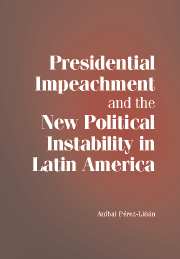Book contents
- Frontmatter
- Contents
- List of Tables and Figures
- Preface and Acknowledgments
- 1 INSTITUTIONAL CRISES IN PRESIDENTIAL REGIMES
- 2 FIVE CASES OF IMPEACHMENT AND A PRESUMED MADMAN
- 3 PRESIDENTIAL CRISES AND THE DECLINE OF MILITARY INTERVENTION
- 4 LATIN AMERICA IN THE AGE OF SCANDAL
- 5 SCANDALS AND THE POLITICAL ECONOMY OF POPULAR OUTRAGE
- 6 BUILDING A LEGISLATIVE SHIELD: THE INSTITUTIONAL DETERMINANTS OF IMPEACHMENT
- 7 TOWARD A NEW PATTERN OF POLITICAL INSTABILITY
- 8 RETHINKING LATIN AMERICAN PRESIDENTIALISM
- References
- Index
- Titles in the series
8 - RETHINKING LATIN AMERICAN PRESIDENTIALISM
Published online by Cambridge University Press: 25 July 2009
- Frontmatter
- Contents
- List of Tables and Figures
- Preface and Acknowledgments
- 1 INSTITUTIONAL CRISES IN PRESIDENTIAL REGIMES
- 2 FIVE CASES OF IMPEACHMENT AND A PRESUMED MADMAN
- 3 PRESIDENTIAL CRISES AND THE DECLINE OF MILITARY INTERVENTION
- 4 LATIN AMERICA IN THE AGE OF SCANDAL
- 5 SCANDALS AND THE POLITICAL ECONOMY OF POPULAR OUTRAGE
- 6 BUILDING A LEGISLATIVE SHIELD: THE INSTITUTIONAL DETERMINANTS OF IMPEACHMENT
- 7 TOWARD A NEW PATTERN OF POLITICAL INSTABILITY
- 8 RETHINKING LATIN AMERICAN PRESIDENTIALISM
- References
- Index
- Titles in the series
Summary
A new pattern of political instability has emerged in Latin America. It took shape in the 1990s and consolidated in the early 2000s. In contrast to the experience of past decades, this trend is unlikely to compromise the stability of democratic regimes, but it is lethal for democratic governments. Within a few years, political crises without regime breakdown have become a common occurrence in Latin American politics – and presidential impeachment has become the main institutional expression of this trend.
I argued in Chapter 7 that those crises have shared several distinctive traits. First, military officers – bounded by international constraints and by the disastrous experience of military rule in the 1970s – have refused to intervene in politics (or failed on the few occasions when they have tried). Second, the mass media have played a new role as guardians of public morality. Third, popular uprisings against corruption or bad economic performance have driven – in the absence of military coups – the resignation of the president. And, last but not least, given the previous conditions Congress has shouldered the enormous responsibility of guaranteeing the constitutional transfer of power in the midst of the political debacle. This historical context has created conditions for the multiplication of presidential impeachments, although several political crises have led to alternative outcomes for reasons discussed in the previous chapter.
Until recently, this trend was virtually ignored in the specialized literature.
- Type
- Chapter
- Information
- Publisher: Cambridge University PressPrint publication year: 2007



